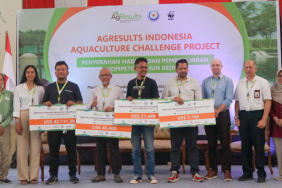SUSTAINABLE FISHERIES BECOMES THE ORIENTATION OF GALE-GALE FISHERMEN
Island Tujuh is a group of islands located in the District of Seram Utara Barat, Central Maluku Regency, Maluku Province and is included in the prospective area of the Coastal and Small Island Conservation Area (KKP3K) of Serutbar Small Island Park (Seram Utara and Seram Utara Barat). Gale-Gale Village is one of the coastal villages facing Tujuh Island, where the community mostly works as fishermen who use bottom gill nets with compressor aids to catch kite fish (Decapterus macarellus) and banana-pisang/yellow-tailed fish (Pterocaesio spp).
"Compressors have been operated in Gale-Gale Village since 2007 as a breathing apparatus during diving to make it easier for fishermen to lift the net from the bottom of the water which is a coral reef ecosystem," said Bachtiar Wally, one of the compressor fishermen in Gale-Gale Village. However, in the operation of the basic gill net, it is placed above the coral reef at a depth of ± 15 meters, which causes coral reefs to often be transported in the net and when lifting the net by fishermen who dive using compressors, they often step on coral reefs. So that these fishing activities have great potential in damaging the coral reef ecosystem as a home for fish.
As mentioned in Law No. 45 of 2009 concerning amendments to Law No. 31 of 2004 concerning Fisheries, in Article 9 Paragraph 1 which states that compressors include fishing aids that interfere with and damage the sustainability of fish resources. It is also explained in KKP Directorate General PSDKP Memorandum Number 536/DJPT.2/PI.370/VII/2013, that compressors are prohibited from being used by divers for fishing activities that damage the environment, for example lifting, hitting and stepping on coral reefs.
WWF-Indonesia as the implementer of the USAID Sustainable Ecosystems Advanced (USAID SEA) Project has been working with stakeholders to minimize the use of compressors in Gale-Gale Village, both through socialization activities and direct visits to the site for discussions with fishermen. Fishermen remain unconcerned about the dangers of using compressors, as they have yet to experience the negative health impacts of using compressors. "Prohibiting the use of compressors is the same as prohibiting smoking," said one of the compressor fishermen during a discussion with the WWF-Indonesia team. The fishermen think that the compressor is used properly, not using bombs or potassium and the catch is very encouraging for their household economy, so they do not think about the negative impact of the compressor.
Based on the daily fisheries data collection conducted by the WWF-Indonesia Fisheries Enumerator Team, the total fish catch from the basic gillnet gear has decreased. It is known that in the first period of data collection from November 2017-October 2018 the total catch recorded was ±77.6 tons, while in the second period of data collection from December 2018-October 2019 was ±48.8 tons. This is very much complained about by most compressor fishermen. "Last year, if counted, once throwing the net, all of these compressor fleets can earn a total of 15 to 20 million. However, now the fish are getting harder and playing far into deeper waters. Once you throw out the net, you get Rp. 500,000, which is already a profit, and the important thing is to return the gasoline capital," said Usman, one of the compressor fishermen in Gale-Gale Village. "I can't find any fish, only dead corals that get caught in the net," continued Kamil, a compressor fisherman's crew.
The WWF-Indonesia Fisheries Enumerator Team has routinely approached the compressor fishermen of Gale-Gale Village to discuss the dangers of using compressors, accompanied by showing videos related to destructive fisheries practices. These activities are carried out as a process of sensitizing fishermen to be able to reduce the activity of using compressors and switch to environmentally friendly fishing gear to maintain the sustainability of fisheries resources.
Seeing the declining catches of fishermen, they are increasingly aware of the importance of maintaining fish stocks for resource sustainability. In 2019 until mid-2019 there were 9 active fleets using compressors, currently 4 fleets are still actively using compressors. Fishermen who abandoned compressors switched to the most selective API (Fishing Gear), namely handline fishing. "Currently, fishing income is better than participating in compressor nets and there is no burden of sewing nets and maintaining compressors," said Kamil.
Currently WWF-Indonesia is reviewing the extent and location of zoning based on input from fishermen, especially fishermen of Gale-Gale Village from the results of Public Consultation I for the Management Plan and Zoning (RPZ) of Serutbar KKP3K. With this change process, WWF-Indonesia will continue to approach and support the reduction of compressor use in the prospective KKP3K TPK Serutbar by conducting Better Management Practice socialization or practical guidelines for sustainable fisheries practices. So that fishermen on the Serutbar coast can participate in managing their marine resources so that they continue to increase and be sustainable.





